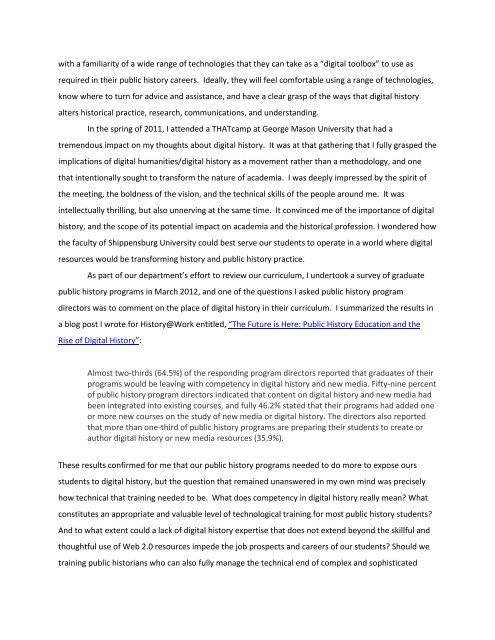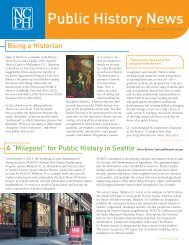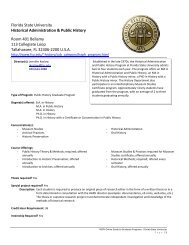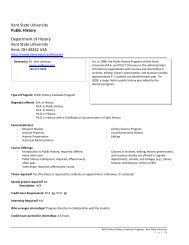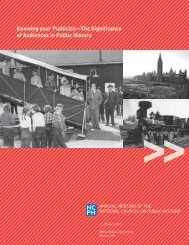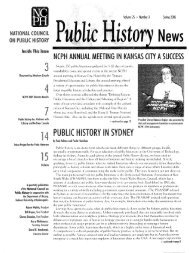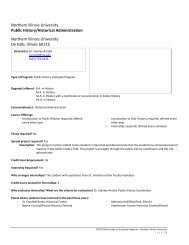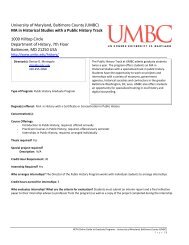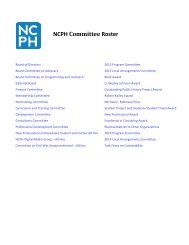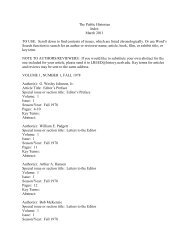Case Statement - National Council on Public History
Case Statement - National Council on Public History
Case Statement - National Council on Public History
You also want an ePaper? Increase the reach of your titles
YUMPU automatically turns print PDFs into web optimized ePapers that Google loves.
with a familiarity of a wide range of technologies that they can take as a “digital toolbox” to use as<br />
required in their public history careers. Ideally, they will feel comfortable using a range of technologies,<br />
know where to turn for advice and assistance, and have a clear grasp of the ways that digital history<br />
alters historical practice, research, communicati<strong>on</strong>s, and understanding.<br />
In the spring of 2011, I attended a THATcamp at George Mas<strong>on</strong> University that had a<br />
tremendous impact <strong>on</strong> my thoughts about digital history. It was at that gathering that I fully grasped the<br />
implicati<strong>on</strong>s of digital humanities/digital history as a movement rather than a methodology, and <strong>on</strong>e<br />
that intenti<strong>on</strong>ally sought to transform the nature of academia. I was deeply impressed by the spirit of<br />
the meeting, the boldness of the visi<strong>on</strong>, and the technical skills of the people around me. It was<br />
intellectually thrilling, but also unnerving at the same time. It c<strong>on</strong>vinced me of the importance of digital<br />
history, and the scope of its potential impact <strong>on</strong> academia and the historical professi<strong>on</strong>. I w<strong>on</strong>dered how<br />
the faculty of Shippensburg University could best serve our students to operate in a world where digital<br />
resources would be transforming history and public history practice.<br />
As part of our department’s effort to review our curriculum, I undertook a survey of graduate<br />
public history programs in March 2012, and <strong>on</strong>e of the questi<strong>on</strong>s I asked public history program<br />
directors was to comment <strong>on</strong> the place of digital history in their curriculum. I summarized the results in<br />
a blog post I wrote for <strong>History</strong>@Work entitled, “The Future is Here: <strong>Public</strong> <strong>History</strong> Educati<strong>on</strong> and the<br />
Rise of Digital <strong>History</strong>”:<br />
Almost two-thirds (64.5%) of the resp<strong>on</strong>ding program directors reported that graduates of their<br />
programs would be leaving with competency in digital history and new media. Fifty-nine percent<br />
of public history program directors indicated that c<strong>on</strong>tent <strong>on</strong> digital history and new media had<br />
been integrated into existing courses, and fully 46.2% stated that their programs had added <strong>on</strong>e<br />
or more new courses <strong>on</strong> the study of new media or digital history. The directors also reported<br />
that more than <strong>on</strong>e-third of public history programs are preparing their students to create or<br />
author digital history or new media resources (35.9%).<br />
These results c<strong>on</strong>firmed for me that our public history programs needed to do more to expose ours<br />
students to digital history, but the questi<strong>on</strong> that remained unanswered in my own mind was precisely<br />
how technical that training needed to be. What does competency in digital history really mean? What<br />
c<strong>on</strong>stitutes an appropriate and valuable level of technological training for most public history students?<br />
And to what extent could a lack of digital history expertise that does not extend bey<strong>on</strong>d the skillful and<br />
thoughtful use of Web 2.0 resources impede the job prospects and careers of our students? Should we<br />
training public historians who can also fully manage the technical end of complex and sophisticated


